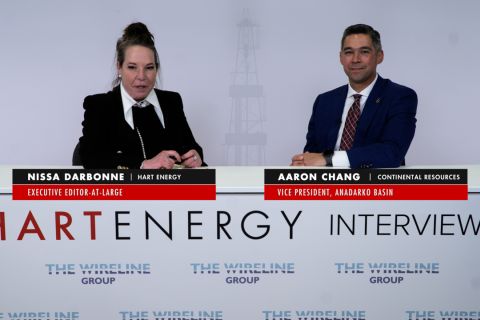
A proxy vote related to the proposed merger between Chevron Corp. and Hess Corp. is coming up on May 28, and Hess’ position offshore Guyana has shareholders split. (Source: Shutterstock)
A proxy vote related to the proposed merger between Chevron Corp. and Hess Corp. is coming up on May 28, and Hess’ position offshore Guyana has shareholders split.
Chevron’s $53 billion all-stock offer for Hess will allow Chevron to add assets in the U.S. Gulf of Mexico, offshore Southeast Asia and in the Bakken. But Hess’ 30% interest offshore Guyana in the prolific Stabroek Block is arguably the most important asset.
Hess’ Stabroek interest has spurred a spat between Chevron and the block’s operators Exxon Mobil Corp. and China National Offshore Oil Corp. (CNOOC). Exxon Mobil owns 45% interest in Stabroek, while CNOOC owns 25% interest, and both claim they have a right of first refusal (ROFR) to Hess’ 30% interest.
There are notable reasons Exxon and CNOOC are willing to fight for their ROFR.
In Stabroek, the Exxon-led consortium has found slightly over 11 Bboe of resources, potentially enough to underpin up to 10 FPSOs, according to Exxon and Hess. And Exxon Mobil expects gross production in Stabroek to reach 1.3 MMbbl/d by 2027 using just six FPSOs.
Considering arbitration-related delays, Chevron’s deal with Hess could close in 2025, David Deckelbaum, TD Cowen managing director, wrote in a commentary in April.
RELATED
Guyana’s Stabroek Boosts Production as Chevron Watches, Waits
Divided lines: yes, no, maybe?
Most recently, Hess shareholders have been urged by Glass, Lewis & Co., an independent proxy voting and corporate governance advisory, to vote for the merger with Chevron.
In a report to shareholders, Glass, Lewis & Co. said “the strategic and financial merits of the proposed merger are sound and reasonable.”
Glass, Lewis & Co. also advised shareholders that the merger was an opportunity to participate in any future upside to come from the combined companies.
“We strongly believe that voting for the all-stock Chevron transaction now is the best, most accretive value option for our shareholders and look forward to the successful completion of our merger,” Glass, Lewis said in the report, citing Hess CEO John Hess.
Hess shareholders are expected to benefit from increased cash returns—nearly nine times the current level—including dividends and share repurchases upon the transaction’s closing, Hess said in the release.
“The proposed all-stock deal allows current Hess shareholders to continue to participate in the upside of Chevron’s free cash flow growth,” Hess said.
RELATED
Exxon Versus Chevron: The Fight for Hess’ 30% Guyana Interest
But on the opposite side of the fence, larger Hess shareholders have warned they plan to abstain from voting.
New York-based investment firm D.E. Shaw & Co., the 14th-largest shareholder in Hess, plans to abstain from voting, Bloomberg reported on May 20. The main reason is to wait out more clarity around the arbitration cases. HBK Capital Management, Hess’ fifth-largest investor, is in agreement with D.E. Shaw, according to the news agency.
Institutional Shareholder Services Inc. also advised investors to not support the deal and instead vote for a delay, Bloomberg said in the report.
Recommended Reading
Exclusive: ABS Moving Forward with Offshore CCUS Projects
2024-06-06 - Experts from offshore operator ABS discuss the company’s sustainability measures for marine and offshore industries and limitations with decarbonization techniques, in this Hart Energy Exclusive interview.
Exclusive: Continental Dives Deep Into Anadarko's Complexities
2024-06-03 - The Anadarko Basin's complexities are not stopping Continental Resources from capitalizing on its resources and eyeing acreage that may possibly be on the market soon following the closing of some big deals, the company's Vice President of the Anadarko Basin Aaron Chang told Hart Energy's Nissa Darbonne at SUPER DUG.
Exclusive: Tenaris’ Zanotti: Pipes are a ‘Matter of National Security’
2024-04-12 - COVID-19 showed the world that long supply chains are not reliable, and that if oil is a matter of U.S. national security, then in turn, so is pipe, said Luca Zanotti, U.S. president for steel pipe manufacturer Tenaris at CERAWeek by S&P Global.
Exclusive: Sabine CEO says 'Anything's Possible' on Haynesville M&A
2024-04-09 - Sabine Oil & Gas CEO Carl Isaac said it will be interesting to see what transpires with Chevron’s 72,000-net-acre Haynesville property that the company may sell.





